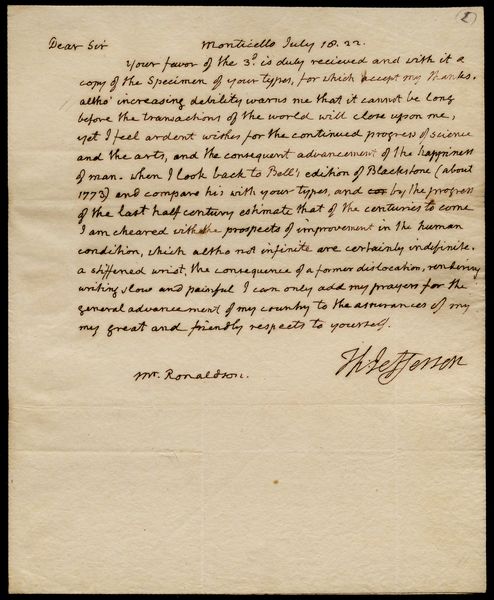Jefferson, Thomas (1743-1826) to James Ronaldson
High-resolution images are available to schools and libraries via subscription to American History, 1493-1943. Check to see if your school or library already has a subscription. Or click here for more information. You may also order a pdf of the image from us here.
A high-resolution version of this object is available for registered users. LOG IN
Gilder Lehrman Collection #: GLC00496.042 Author/Creator: Jefferson, Thomas (1743-1826) Place Written: Philadelphia Type: Autograph letter signed Date: 18 July 1822 Pagination: 1 p. : free frank ; 25 x 20 cm. Order a Copy
Docketed by Ronaldson. Jefferson compares the speciments (probably Ronaldson and Binney no. 1) to those used in a book in the mid-eighteenth century, and is cheered by the prospect of human progress. Ronaldson-Binney's first typeface was the first typeface designed in America and became the basis for "Monticello" the font used for printing the modern edition of the Papers of Thomas Jefferson.
Note: Not in Bergh or Ford, but compare Bergh 12: 293-96, a letter of introduction from TJ to Dupont de Nemours in 1809, for Ronaldson, who sought antimony for his business. Ronaldson, in partnership with Archibald Binney, was the first American typefounder. Together they introduced original "modern" roman typefaces to America. Robert Bell, a London printer, introduced his modern roman "Bell type" in the 1770s. He issued inexpensive editions of important writers, and is said to have been the first British printer to eliminate the long "s" in his presswork.
Monticello July 18. 22
Dear Sir
Your favor of the 3d. is duly recieved and with it a copy of the Specimen of your types, for which accept my thanks. Altho' increasing debility warns me that it cannot be long before the transactions of the world will close upon me, yet I feel ardent wishes for the continued progress of science and the arts, and the consequent advancement of the happiness of man. When I look back to Bell's edition of Blackstone (about 1773) and compare his with your types, and [strikeout] by the progress of the last half century estimate that of the centuries to come I am cheared with the prospects of improvement in the human condition, which altho not infinite are certainly indefinite. A stiffened wrist, the consequence of a former dislocation, rendering writing slow and painful I can only add my prayers for the general advancement of my country to the assurances of my my [sic] great and friendly respects to yourself.
Th: Jefferson
Mr. Ronaldson.
[address leaf:]
free Free
Th: Jefferson
Mr. James Ronaldson
Philadelphia
Citation Guidelines for Online Resources
The copyright law of the United States (title 17, United States Code) governs the making of photocopies or other reproductions of copyrighted material. Under certain conditions specified in the law, libraries and archives are authorized to furnish a photocopy or other reproduction. One of these specific conditions is that the photocopy or reproduction is not to be “used for any purpose other than private study, scholarship, or research.” If a user makes a request for, or later uses, a photocopy or reproduction for purposes in excess of “fair use,” that user may be liable for copyright infringement. This institution reserves the right to refuse to accept a copying order if, in its judgment, fulfillment of the order would involve violation of copyright law.
